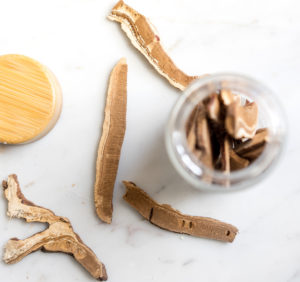PRODUCTIVITY & FOCUS
How To Boost Holistically

We’ve fallen into a culture of hustle. Where being stressed is somehow equivalent to a first-place medal. At the end of the day, not a single one of us actually wants more stress in our lives (unless you’re a glutton for self punishment), so it’s time to work smarter, not harder when it comes to being productive.
Eastern Medicine is all about caring for every part of your being. Not just your body, but your mental and emotional health too. The goal should be to maintain a sense of balance in all aspects of life. We’re talking more check marks on your to-do list, and a whole lot more peace along the way.
Start the Day With Meditation
 Just because your Alexa has 100 reminders for you today doesn’t mean your brain can handle all of them at once. When you try to be productive while feeling overwhelmed you’re bound to get in your own way. To slow down your racing thoughts and find the mental clarity you need to actually be productive, start your morning with meditation.
Just because your Alexa has 100 reminders for you today doesn’t mean your brain can handle all of them at once. When you try to be productive while feeling overwhelmed you’re bound to get in your own way. To slow down your racing thoughts and find the mental clarity you need to actually be productive, start your morning with meditation.
It’s way more than just “quiet time”, though. Meditation can help reduce or manage anxiety, depression, stress, and pain. It’s also used by many high-achievers to help boost concentration and focus, increase self-awareness, gain new perspectives on situations, and improve creativity and patience. Block out 10 to 30 minutes of your morning to find a comfortable seat in a peaceful environment and release your thoughts. Take deep breaths of equal measure in and out of your nose and focus your attention purely on that breath. When you keep your attention on the present moment, it’s much easier to keep those distracting thoughts away.
Set Your Intentions
 Now that you’ve started out on the right foot with meditation, your mind and heart should be in the perfect place to set the day’s intentions. Pull out your planner or phone notes, write down your top three to five intentions for the day. Before you write down your top five tasks from your to-do list, pause and think for a moment. These tasks don’t define you, do they?
Now that you’ve started out on the right foot with meditation, your mind and heart should be in the perfect place to set the day’s intentions. Pull out your planner or phone notes, write down your top three to five intentions for the day. Before you write down your top five tasks from your to-do list, pause and think for a moment. These tasks don’t define you, do they?
Eastern Medicine, and specifically Traditional Chinese Medicine, is built around a holistic foundation. The mind, heart, and body are all integral to our health and wellness. Following this idea, think about your top priorities for the day. What do you want to accomplish? How do you want to feel as you move through the day? List your intentions as “I am/will/have” statements and be very specific. Some examples of intentions include; “I am worthy of love” or “I am a confident leader”.
Implement the Chinese Body Clock
 Now that your mind is clear and your intentions are set, let’s create a schedule that aligns with the Chinese Body Clock. You know how when you go too long without eating, you can become seriously “hangry”? That’s a simple example of how what and when we eat affects how we feel. The Chinese Body Clock is a map outlining those high and low energy times and offers suggestions for the best way to work with them. Within a day, our qi, or energy, moves through the body at two hour intervals. These 12 movements result in certain strengths and weaknesses throughout our day.
Now that your mind is clear and your intentions are set, let’s create a schedule that aligns with the Chinese Body Clock. You know how when you go too long without eating, you can become seriously “hangry”? That’s a simple example of how what and when we eat affects how we feel. The Chinese Body Clock is a map outlining those high and low energy times and offers suggestions for the best way to work with them. Within a day, our qi, or energy, moves through the body at two hour intervals. These 12 movements result in certain strengths and weaknesses throughout our day.
According to the Chinese Body Clock, it’s good to be an early riser. You should be “up and at ‘em” and ready to eat breakfast between 7 to 9am. The next block, from 9 to 11am is designated at the best time of day to accomplish your most challenging tasks or exercise. Between 11am and 1pm is the Chinese Body Clock’s suggested time to fuel up with a light lunch, hydrate, and rest. The second most energetically productive time of day arrives from 1 to 3pm, so wrap up that busy work or get your exercise in during this time if you didn’t earlier. By the 3 to 5pm block you should shift into more deep, thought-provoking work, or reading before ending your work for dinner between 5 and 7pm. Night owls beware, the suggested hours to head to sleep are between 9 and 11pm so that you can get a full night’s rest before another productive day arrives.
Eat These Foods for Brain Power

The fuel you’re giving (or not giving) your body can play a huge part in your level of productivity. From that crack-of-dawn yogurt to those cute little individually packed cheese rounds, make sure that you’re getting the nutrients you need for maximum brain power. We all know that aiming for a healthy and balanced diet is key to general health long-term. When it comes to your brain function, however, TCM practitioners suggest adding some extra servings of these special foods to your diet:
- Walnuts
- Pine nuts
- Sesame Seeds
- Almonds
- Pumpkin
- Corn
- Spinach
- Carrots
- Apples
- Bananas
- Reishi Mushrooms
- Fish
- Shrimp
- Pork
- Eggs
Reishi mushrooms are known for being an adaptogen, or types of foods noted for being particularly good at helping the body protect itself from pathogens. In TCM, reishi is said to give people a sense of calm and increase concentration ability. If you want to add a brain-oriented supplement to your routine, give fish oil a try. The omega-3’s help work with your body’s enzymes to coordinate several brain mechanisms. Don’t forget to stay hydrated too! While food provides important nutrients, all of our bodies need water to thrive.
Try the Pomodoro Technique
Do you find you start working on a task only to somehow wind up deep in some Instagram rabbit hole? It can sometimes be pretty scary how easily it is to get distracted. To help you in your battle with focus, give The Pomodoro Technique a try. This process breaks up your work into 25-minute segments, with a planned break in between. After each 25 minute pomodoro, you’ll take a 3 to 5 minute break. Once you’ve completed 4 pomodoros (or 25 minute sets), you take a 15 to 30 minute break. Then the cycle repeats until you’ve completed all your activities.
One thing you should definitely do is keep your phone in another room, or at least out of arm’s reach during your pomodoro times. During your breaks, move away from your desk to get some physical movement and create a mental separation between work and rest. The Pomodoro Technique has been celebrated by users for its ability to help increase productivity, reduce interruptions, increase awareness and motivation, and ease anxiety surrounding work.
Use Essential Oils for Focus
 Get all your senses involved in your mission of productivity! Do certain colognes remind you of your dad or that high school boyfriend who wore way too much? Or does the smell of freshly baked cookies bring comfort? Our sense of smell has been proven by many studies to be deeply tied to our memory. Essential oils are bottled herbal oils carrying strong scents. They can be used in diffusers to spread the scent around a room, create soothing cold compresses, or diluted with water and used directly on the skin. Over the years, there have been studies on the effects of specific herbs on our minds. These essential oils have been said to help you find greater alertness, clarity of thought, deeper concentration, and keep you focused on the tasks at hand.
Get all your senses involved in your mission of productivity! Do certain colognes remind you of your dad or that high school boyfriend who wore way too much? Or does the smell of freshly baked cookies bring comfort? Our sense of smell has been proven by many studies to be deeply tied to our memory. Essential oils are bottled herbal oils carrying strong scents. They can be used in diffusers to spread the scent around a room, create soothing cold compresses, or diluted with water and used directly on the skin. Over the years, there have been studies on the effects of specific herbs on our minds. These essential oils have been said to help you find greater alertness, clarity of thought, deeper concentration, and keep you focused on the tasks at hand.
- Peppermint
- Lavender
- Cedarwood
- Rosemary
- Basil
- Lemongrass
- Cypress
- Patchouli
- Ylang-ylang
A study on peppermint and ylang-ylang showed that smelling peppermint enhanced alertness, focus, concentration, and accuracy of memory. TCM practitioners have also found in repeated scenarios that rosemary greatly enhances patient’s mental clarity and memory recall. The beauty of essential oils is that they can also be combined. Select a few of your favorite scents from the list and create your own brain power recipe to diffuse next to your work station.
Do you have a favorite productivity hack? We’d love to hear about it. Share with our community on social media!
Comments (0)
Leave a reply
You must be logged in to post a comment.




